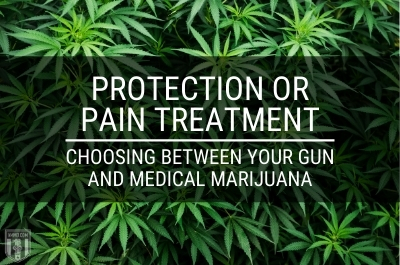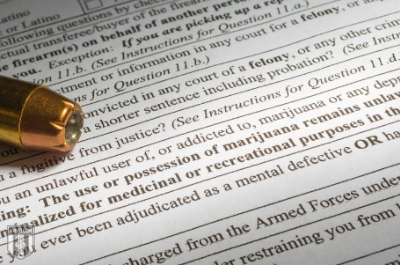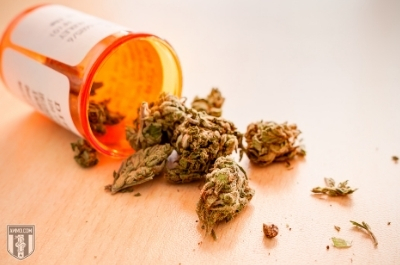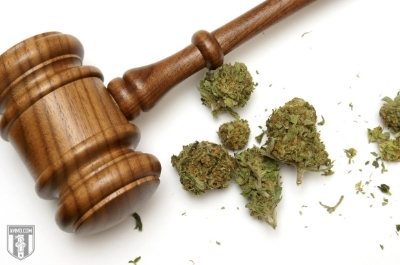 If you’ve ever filled out a Form 4473, you’re familiar with the Question 11e: “Are you an unlawful user of, or addicted to, marijuana or any depressant, stimulant, narcotic drug, or other controlled substance?” In case you thought there was any ambiguity with regard to medical marijuana, you were wrong. Indeed, there is a warning in bold right underneath the question that clarifies:
If you’ve ever filled out a Form 4473, you’re familiar with the Question 11e: “Are you an unlawful user of, or addicted to, marijuana or any depressant, stimulant, narcotic drug, or other controlled substance?” In case you thought there was any ambiguity with regard to medical marijuana, you were wrong. Indeed, there is a warning in bold right underneath the question that clarifies:
“Warning: The use or possession of marijuana remains unlawful under Federal law regardless of whether it has been legalized or decriminalized or for medicinal or recreational purposes in the state where you reside.”
Regardless of what one thinks about marijuana, its legalization or the right of the federal government to regulate either drugs or the internal laws of the various states, the fact remains: As of now, possession, sale and cultivation of marijuana remains a federal offense. It is a Schedule I drug in the same category as heroin and cocaine. You might not like that and you might think such classifications are ridiculous. The federal government doesn’t care.
This is a particularly difficult issue for people who use medicinal marijuana for bona fide medical purposes, rather than as a sort of legal loophole to consume marijuana legally. Many people use medicinal marijuana for a variety of purposes including relief from pain, Alzheimer’s symptoms, glaucoma, epilepsy and a number of complications related to cancer, including nausea and lack of appetite. The science on this is rather conclusive, so much so that Big Pharma makes legal synthetic THC pills known as marinol.
For those who use medical marijuana and wish to protect themselves with firearms, there is a choice: you can keep your guns or you can keep your grass or you can break the law.
What Is the Law Regarding Guns and Marijuana?
 In 2011, the Bureau of Alcohol, Tobacco and Firearms clarified its stance – it is not legal for anyone who uses any illegal substance to own firearms. This includes marijuana, which is legal according to some state laws, illegal according to others, and also illegal under federal law.
In 2011, the Bureau of Alcohol, Tobacco and Firearms clarified its stance – it is not legal for anyone who uses any illegal substance to own firearms. This includes marijuana, which is legal according to some state laws, illegal according to others, and also illegal under federal law.
The relevant federal law is 18 U.S.C. 922 § (g)(3), which prohibits anyone who uses any controlled substance, as defined by the Controlled Substances Act, from owning firearms. It’s not specific to marijuana. It includes every controlled substance. However, marijuana is worth talking about specifically because of its quasi-legal status, including in a number of relatively gun-friendly states such as Arizona, New Hampshire, Colorado, Michigan, and Nevada.
It’s easy to be cynical about the motivations of the federal government with regard to this topic. However, it is worth briefly noting a couple of facts regarding marijuana with regard to mental health. Marijuana is closely associated with a number of psychiatric disorders, including schizophrenia, but also anxiety, paranoia and even psychosis, though the last of these is quite rare. One might wish to hand-wave this as “reefer madness,” but the correlation if not the causation is well documented.
One might object that those with SSRIs are allowed to legally possess firearms, despite the fact that these have been proven to be dangerous. We don’t disagree that there is a correlation between SSRI use and abuse and gun violence. However, SSRIs being dangerous – or even more dangerous than marijuana – does not make marijuana any less dangerous than it is.
In the interest of balance, we’ll end this section by noting that correlation is not causation. Some have argued that it’s less that marijuana causes schizophrenia than those who have schizophrenia are more likely to use marijuana as a form of symptom relief. We will not attempt to decide which hypothesis is true, but the facts regarding marijuana and mental health bear mentioning.
What Are the Penalties for Ignoring the Law?
We are not encouraging anyone to break the law. And, indeed, the penalties for doing so with regard to firearms are always stiff. Using and possessing marijuana are no exceptions. So what are the penalties for those who simply choose to flout the law and continue using marijuana – legal or otherwise, because remember that the feds don’t recognize the difference – while owning firearms?
First, we should mention that some states, such as Colorado, have prohibited information sharing that would tie your ownership of firearms to your status as a medical marijuana patient. Other states, such as Illinois, have ruled that you can legally own firearms as a medical (or otherwise legal – Illinois is a recreational state) marijuana user. Illinois is not the most gun-friendly state in the Union by a longshot, but it has explicitly said that it will not assist the federal government in stripping otherwise law-abiding citizens of their firearms while also providing them with the same friendly warning that we will throughout this article: that the feds still consider it a crime, so be careful.
But again, the federal law is what is most important for our purposes right now. And the federal appeals courts have upheld bans on medical marijuana users from legally possessing firearms. What’s more, even states that are friendly to medical marijuana have not taken a clear stand on what will happen to people who are stopped in possession of legal firearms and a legal amount of marijuana.
There are two parts of the law here: First, the question of what will happen to you if the feds show up and you have marijuana and a firearm. The second is the question of what will happen if the feds decide to hit you for lying on your form – a lesser, but still serious charge. Neither situation will play out well for you: The federal penalty for being in possession of a firearm, while also in possession of illegal drugs, is ten years in the federal pen. The federal penalty for lying on your Form 4473 is five years in prison.
It’s worth pointing out that if you’re guilty of one, you’re probably guilty of both, so let’s just call that 15 years. And while Jeff Bezos’ left-wing vanity blog The Washington Post has stated that “Your chances of being prosecuted by the Justice Department for falsifying information to illegally buy a gun are almost zero,” no serious person would advise you to lie on your form. This is illegal and a highly risky gambit.
Still, facts are facts and numbers usually don’t lie: The NICS system denied gun purchases 112,000 times in 2017, because they were in forbidden categories. Of these, the ATF investigated 12,700. Of these, a whopping 12 were prosecuted. However, Attorney General William Barr has stated that the feds plan to investigate and prosecute so-called “lie and try” cases with increased vigor, so we might see more prosecutions in the future.
Note that it is not just marijuana users who might fall afoul of federal authorities because of this: literally anyone involved in the cultivation or distribution of medical marijuana is engaged in a federal crime. Thus, they are subject to being penalized in the same way that any other drug user – or drug dealer – might be. Further, all of these laws apply not just to guns, but to ammunition as well.
Again, we cannot state this clearly and unambiguously enough: Purchasing a firearm while using illegal drugs, of which even “medical marijuana” is one, is a federal offense carrying serious penalties, and we obviously urge anyone considering ignoring the law to not do so. The feds are not joking around with people that they prosecute for these crimes.
If you take umbrage at this legal situation, we urge you to contact your state legislators, particularly those who might be on record as sharing your views on the matter. There is a growing movement in America’s state legislatures to protect medical marijuana users who wish to peacefully exercise their Second Amendment rights.
What’s the Deal With Enforcement?

The purpose of this provision of the law at the time was to create an easy way for the feds to hand out sentence enhancements for drug dealers or domestic terrorists who were also potheads, due to the strong presence of cannabis use among the counter-culturalists who populated the far left during this time period. If we’re going back to original intent, this provision was not crafted with now-legal medical marijuana users in mind. This is an important point to raise because of the mental health issues alluded to above – this law was not designed for such problems.
As such, there isn’t really an enforcement apparatus set up for this specific law, nor can federal authorities realistically enforce it on a mass scale. There are likely tens, if not hundreds, of thousands of medical marijuana users in the United States who also own otherwise legal firearms. There is also the spectre of people who are involved in the legal marijuana trade who have absolutely nothing to do with cultivation or sale, such as security guards, who often carry firearms and are technically in violation of this law. For the feds to begin targeting such otherwise law-abiding citizens would mean either a massive crackdown on a significant part of the population or using a few high-profile cases to set an example for everyone else.
If this law were enforced in any systematic manner, medical marijuana dispensaries would have no means of defending themselves from criminals, because their security guards couldn’t be armed with anything currently classed as a firearm. This – and the generous tax revenues that flow from it – is primarily why state governments have chosen to look the other way on enforcing or helping to enforce this aspect of federal law. Not only are there tons of people violating it, but consistent and rigorous enforcement would lead to a significant drop in state tax revenues collected, which would, in turn, lead to significant cuts in social services offered by state governments.
Because the IRS doesn’t allow any deductions, they’re making a killing off of marijuana taxation – about 40 percent.
Is it Constitutional to Prohibit Medical Marijuana Users From Possessing Firearms?
There is also a solid basis for the law prohibiting medical marijuana users from owning firearms being unconstitutional. First there is the question as to whether or not any restrictions on firearms ownership actually pass constitutional muster. But beyond this, the law has been challenged by those who are not the Second Amendment ideological purists that we are.
A Philadelphia-based doctor named Matthew Roman filed suit after a licensed firearms dealership didn’t allow him to purchase a firearm after he answered this notorious question honestly. His argument isn’t based on the Second Amendment at all (and it’s a good thing, because the courts generally do not agree with our “no exceptions” view of the Second Amendment). Rather, he appealed to the Fifth Amendment, which protects Americans from self-incrimination, in addition to the Second Amendment, which doubtless all our readers know by heart.
Indeed, the question specifies that the person has used medical marijuana “unlawfully,” which is a dubious question – does the federal government have jurisdiction over the states in this regard? There are certainly arguments in either direction, but this is not entirely settled law. At the very least, the Trump Administration seems to have declared a truce on this matter, looking the other way with regard to the increasing legalization of marijuana, both medical and recreational, throughout the country, ending the Catch-22 harassment of the Obama Administration, which targeted otherwise legal – and tax-paying – medical marijuana facilities on the grounds that they were paying tax on illegal income.
Of course, no one wants to be a Constitutional test case, especially when they’re looking at 15 years in prison if they lose the gambit. But it is worth noting all of these issues with even having such a law on the books and deploying it in a manner that forces people to incriminate themselves.
In April 2019, Republican Congressman Alex Mooney of West Virginia introduced legislation to bring into alignment federal gun laws and the increasing legalization of medical marijuana at the state level. This bill only recognized medical marijuana use and would do nothing for the millions of Americans currently living in states where recreational marijuana is not just legal, but a booming business. Republican Congressman Thomas Massie of Kentucky proposed a similar law, but this legislation would have covered recreational cannabis as well as medical.
How Will This Impact My Right to Concealed Carry?
For those who like to carry concealed, the challenge is twofold: Not only must they potentially give up their guns, they must also give up the practice of carrying concealed when in public.
There was an effort in 2019 to extend the right to carry concealed firearms to medical marijuana patients in Colorado, but it was ultimately unsuccessful. And, indeed, in our research we were not able to find a single state that took the additional step of not just allowing medical marijuana users to own firearms under state law, but also allowing them to carry concealed without molestation.
This is all, of course, a bit of a moot point anyway for those looking to stay within the good graces of the law. Because what good is the right to carry a concealed firearm if you don’t have the right to own a firearm?
The Federal Government Must Address This Disparity

There is also the question of the unintended consequences of this law, which are twofold: First, there is the very real possibility that otherwise law-abiding gun owners will turn to the black or grey market to purchase their firearms out of paranoia that the federal government will target them if they wish to obtain one legally. This might sound far-fetched, but after the hysteria surrounding the Chinese Coronavirus and the civil unrest of the summer of 2020, there is no reason to believe that every otherwise law-abiding citizen will just forfeit their right to self defense because the federal government has forced them to choose between that and pain management or epilepsy.
The flip side of this is all the law-abiding citizens who choose their doctor-recommended treatment of medical marijuana over the right to keep and bear arms. This scenario is much more likely than the previous one, and it’s not a neutral position. People choosing to exercise their Second Amendment rights is a net social positive in addition to simply being a Constitutionally enumerated right. Stripping otherwise law-abiding citizens of their right to keep and bear arms will, conversely, have a net social negative effect in addition to simply being a violation of their rights.
State sovereignty issues likewise enter into the equation. While a certain degree of federal supremacy is a moot point after the American Civil War (to say nothing of the expansive view of the interstate commerce clause), it does seem like a massive amount of federal overreach allowing the feds to effectively strip Second Amendment rights from a group of people who are not breaking any laws in their state. This is particularly egregious because the federal government seems to largely have given up trying to get these states to comply with the federal law that, at least in theory, supersedes it.
Otherwise legal gun owners are thus thrust into making a difficult decision between their rights and the law – a decision that is made particularly cruel thanks to the federal abdication of enforcement.
So which legal decision should you make? That’s not a question we can answer for you. It’s one that only you can answer for yourself after careful consultation with your physician, as well as weighing your options with regards to the potential for a self-defense situation were one to arise. Indeed, because it is disproportionately seniors and the ill who are using medical marijuana, this makes the decision an especially cruel and tragic one. However, until federal law catches up with the medical marijuana laws of your state, it is an unfortunate choice that you must make if you don’t want to end up on the wrong side of the law, facing 15 years in prison.
Protection or Pain Treatment: Choosing Between Your Gun and Medical Marijuana originally appeared in The Resistance Library at Ammo.com.





























![The Kyle Anzalone Show [GUEST] Dave DeCamp: BREAKING: Tucker Carlson detained in ISRAEL! – Trump’s Iran Strategy Exposed!](https://offload-wp-files.sfo3.digitaloceanspaces.com/2026/02/Screenshot-2026-02-27-115531-400x250.png)
